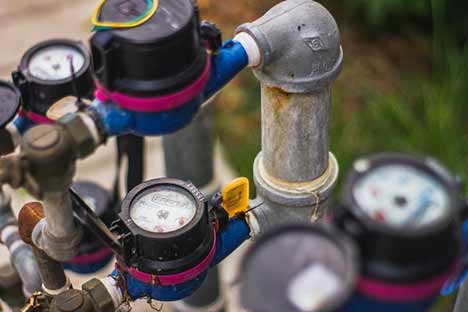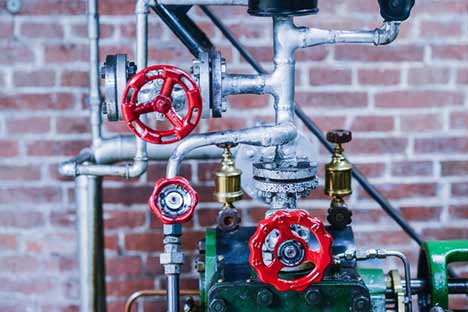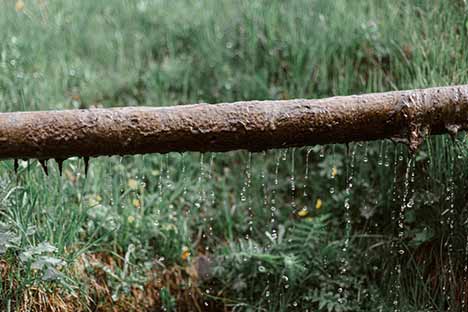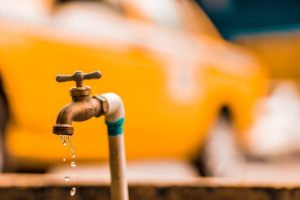
There are many reasons why your home might experience lowered water pressure. From clogged or corroded pipes to valves not being open properly, it can be challenging to figure out why exactly your water pressure is low. However, you don’t have to resort to calling plumbing experts immediately. You can check a few things to ascertain what the problem is. It might even turn out that the plumbing isn’t actually the issue. In order to help you out, we have put together a list of 5 reasons why your home might have low water pressure, and we hope you find it helpful.
1. The main shut off valve isn’t open all the way
If you’ve had to deal with plumbing issues recently, something like a burst pipe, chances are you had to use the main shut-off valve in your house while it was getting fixed. If that’s the case, it might be that you just forgot to open it all the way. The main shut-off valve will either be outside your home or where the city’s water supply connects with your home. If it is a lever, make sure it’s parallel with the pipe. If it’s a handle similar to one on a hose, make sure it’s turned all the way counterclockwise. This is the best possible scenario when your water pressure is low. However, even if this is the problem, you should still know some useful plumbing maintenance tips to ensure you don’t get real plumbing problems.

2. Leaking pipes
Out of all the reasons your home might have low water pressure, leaking pipes are probably the easiest to detect. However, it doesn’t take a big leak to affect your water pressure. Hopefully, you can access your pipes. If you can, take a quick look around to see if there are wet spots or water pooling somewhere. If this is the case, you can try a quick fix. Try to turn off your water supply and wrap a rubber patch around the leaking pipe. This will not be a permanent fix, but it will stop further damage until you can call a plumber. However, it’s vital to get this fixed as soon as possible, as it can become a more serious issue. Experts from Verified Movers note that some people even had to move out of their homes because they ignored leaking pipes.
3. Clogged pipes
Despite what you might believe, clogs don’t only happen immediately beneath drains. Clogs can appear deep within your piping, and unfortunately, even a tiny clog can cause lowered water pressure. This is one of those issues when the problem could be literally anywhere underneath your home. As such, this is a situation where you will want to call expert residential plumbers in the area to have a look. After all, the last thing you want to do is pull apart your plumbing by yourself. Unless you are a professional, you will cause more damage in the process. It is best to rely on professionals to ascertain and fix the problem. Also, it is crucial to do it fast. This is because clogged pipes can evolve into more severe issues if left alone for a while. And a burst pipe is much more expensive to fix than a clogged one.

4. Shared pipelines
When it comes to reasons why your house might have low water pressure, the hardest one to deal with is shared pipelines. To put it simply, shared pipelines are pipes that run water into more than one house. This means that whenever your neighbor does something like take a shower, your water pressure is going to suffer.
One way to deal with this is to change your routine so that you use the water when your neighbor isn’t. Of course, having your pipes replaced is also an option, but this is extremely expensive. Still, relocating might be your best bet if you live in one of the old Chicago homes, a terraced house, or a semi-detached home where the shared water supply is most commonly found. So, if you don’t want to pay for the water you aren’t using, it might be best to find help in the area right away and move to a different house or another neighborhood in Chicago.
5. Faulty pressure regulator
First, it’s important to note that not all plumbing has a pressure regulator. If yours doesn’t, ignore this. However, if it does, there is an easy way to test if the regulator is the problem. You can attach a water pressure gauge to an outside house spigot, preferably one which is close to your pressure regulator. Turn the water on and check the pressure. If it’s lower than what your pressure regulator shows, that’s probably the issue. Replacing a faulty pressure regulator can be done by yourself. However, it’s still better to call a plumber to get it done. Especially if you’re not used to messing with pipes, you could cause unnecessary damage to your piping. This can lead to some serious issues and even you having to rely on emergency plumbers, which isn’t a cheap ordeal usually.

5 reasons your home might have low water pressure – a wrap-up
Altogether, there are many reasons why you might have low water pressure in your home. It could be anything from serious issues to relatively harmless things. The real problem is – well, finding the problem. However, we hope that our list of 5 reasons your home might have low water pressure will help you find what’s causing you troubles. If you know what to look for, you can locate it before it becomes something serious. Acting proactively is always best in these situations. So, if you find a problem that can quickly turn into something else, be sure to contact plumbers to get it fixed immediately.

